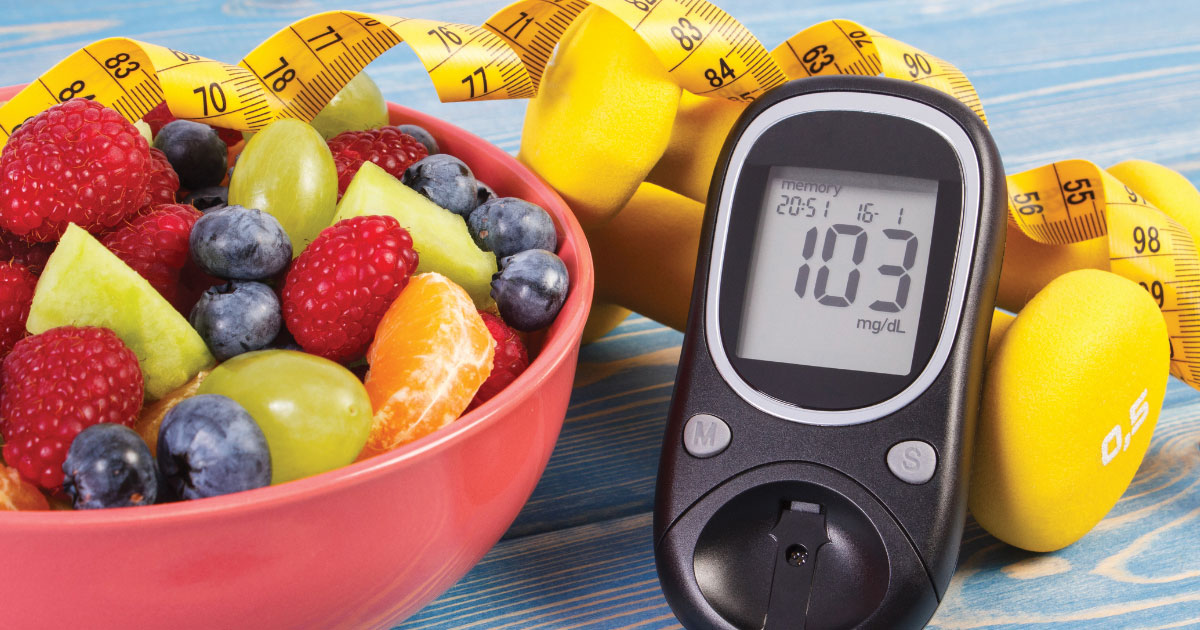
Diabetes is one of the most common metabolic disorders facing Americans every year, and it doesn’t show signs of lessening. In fact, according to the American Diabetes Association, over 38 million people have diabetes in the United States; that accounts for nearly 12% of the total population.1 Diabetes management is typically a complicated medical system that includes medication, regular visits to a doctor, and a healthy diet. Reducing sugar content is one of the major aims of a diabetes diet, but that doesn’t have to mean removing fruits that contain natural sugars.
Diabetes is a chronic condition that is defined by having sustained high levels of sugar (glucose) in the bloodstream. While glucose is the primary source of energy for the body’s cells, high blood glucose levels can cause a number of symptoms and eventually lead to life-threatening complications. Blood sugar levels are normally regulated by a hormone produced by the pancreas called insulin, but people with diabetes either don’t produce enough insulin or the body no longer responds to its effects (insulin resistance).
There are multiple types of diabetes that generally differ by the mechanism of insulin dysfunction. In type 1, the body’s immune system attacks insulin-producing cells and prevents the pancreas from generating it. In type 2 diabetes, however, the insulin is present but the body becomes increasingly resistant to it. Type 2 diabetes is by far the most common version in the U.S. and around the world. Diabetes care for people who suffer from it requires regular injections of insulin as well as alterations to one’s meal plan and portion sizes.
Because of the role sugar plays in increasing diabetes risk, diabetics are obligated to find a balanced diet that includes sugar and other carbohydrates like starch and fiber. This generally means eliminating or strongly curbing the intake of foods that have a high glycemic index (GI); in other words, maintaining health often requires avoiding foods that have added sugar or refined carbs like sweets, candy, and baked goods. These kinds of foods are considered “high GI” because of the way they can cause symptomatic blood sugar spikes.
At first glance, fruit seems like it shouldn’t be an option since it contains sugar; however, fruit has a particular type of sugar called fructose that is considered a simple sugar. Because fructose is a monosaccharide with fewer bonds, it is easier for the body’s metabolism to break it down and cause the absorption of sugar to meet our cell’s energy needs. For this reason, most fruits have a lower glycemic load and therefore don’t have the same potential impact on blood sugar levels.
Though there are some genetic components of diabetes, it usually arises because of a pattern of eating high-carb foods over many years. For anyone who has a sweet tooth, it can be difficult to change this pattern. But a combination of fresh fruit, dried fruit, and (unsweetened) fruit juice can satisfy the urge for sweetness while also lowering the risk of type 2 diabetes symptoms. Not all fruits have the same carb content, though, so it’s important to choose fruits that are a better fit for a diabetes diet:
As beneficial as these fruits can be for managing diabetes, there are plenty of other reasons to include a variety in your diet. Along with vegetables, whole grains, and healthy fats, fruits are a central part of maintaining overall health and wellbeing. Fruits in particular provide a variety of health benefits that range from a reduced risk of heart disease to improved cognition to a more regular digestive process.
Whether you have diabetes or not, fruit remains a healthy choice for any kind of healthy diet. At FruitSmart, we are passionate about being a premium source for fruit juices, essences, concentrates, and purees. Our catalog of versatile products can be used in a huge variety of commercial applications, including beverages, smoothies, cocktail mixes, hard seltzers, nutraceuticals, and baked goods. If you’d like to learn more about how FruitSmart can help you develop your next great recipe, please contact our team today.
